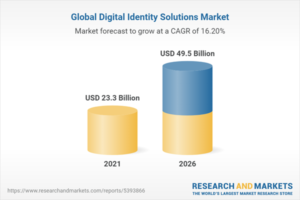Last week the Global Data Justice team ventured to London to attend Identity Week 2021, an identity industry fair that brings together representatives from the private sector, government and intergovernmental organisations to learn about the state of the art and share experiences in implementing identity ‘solutions’. This was our first in-person fieldwork since early 2020 (!) and was an excellent opportunity to gather data on identity industry developments during the pandemic. In this blog post we share some immediate reflections on two intense days of conference pitches and panels, focusing on observations relevant to our work on digital identity in development and humanitarian aid, as well as our ongoing project on pandemic tech with the European AI Fund, before closing with some final thoughts on governance.
Human development as a business opportunity
At one of the conference’s opening keynote talks, a senior representative from Mühlbauer – the German ID tech firm and conference’s title sponsor – lamented the lack of progress on the United Nations Sustainable Development Goal (SDG) 16.9 (‘legal identity for all’): “It’s a shame that we still have a billion people without a legal identity.” He implored not just governments but also non-governmental organisations and fellow industry players to do more to help realise a future in which everyone has ready access to a particular form of identity that firms like his can help provide.
Companies like Tech5, whose co-founder cut his teeth deploying refugee registration systems in Pakistan and Afghanistan, are now building large-scale Automated Biometric Identity Systems in countries such as Indonesia and Guinea. Tech5 has fully embraced the development discourse: the company slogan is “Technologies for Inclusion” and it recently joined the ID2020 alliance, which claims to be “strengthening social and economic development globally” by “developing and applying rigorous technical standards to certify identity solutions, providing advisory services and implementing programs”.
At a panel on ID for development, Niall McCann from the UN Development Program remarked that “There isn’t a government in the world that can register legal identities without help from the private sector.[…] The UN and other international organisations have failed to provide opportunities for private sector firms to connect with governments on this issue. What can we do better?…” A private-sector participant responded that industry would be most likely to respond to calls for engagement with lower- and middle-income country’s ID systems if there was a “price point” that made it attractive for them to do so, for example in terms of scale and the ability to gain access to multiple country markets through participating in an ID intervention. Another “price point” mentioned in the discussion was the amalgamation of identity records into a single centralised database. Asked whether it was preferable to “firewall” different sets of records from each other in order to reduce security vulnerabilities in lower-income countries, industry participants argued that a single, centralised identity record made it easier for the private sector to build services and functions into the system. A comment from a representative of the event’s chief sponsor summed up the position of the vendors present: “the question for us is besides people gaining an identity, how we can convince them to use it in other ways. This is important for us in thinking about the solution.”
While strong industry interest in the SDGs, including 16.9, is unsurprising, it is curious (and, frankly, somewhat uncomfortable) to see defense and security firms like Thales—the partly state-owned French multinational company that specialises in aerospace, defence, transportation and security applications—also adopting the language of human development to advertise their identity tech, while combining these functions with worldwide engagement in military contracting.
Given the discussion of rights, inclusion and the necessity of private-sector involvement, it was surprising to see the ID2020 alliance almost entirely unrepresented (as far as we can tell, Tech5 was the only member present). In contrast, the World Bank’s large-scale, more structural ID4D program and its partners were frequently cited as key market-makers for the vendors present. It suggests a divide has emerged between organisations working on existing civil registration systems and foundational identities (albeit with the aim of connecting those foundational identification functions to other, more commercial ones), and those attempting to re-imagine national ID systems in lower- and middle-income countries on a self-sovereign, more born-commercial model. Established industry players seem to be betting on ID4D’s activities in 63 countries as the main source of future business opportunities, rather than the self-sovereign approach advocated by those developing such technologies.
Implications of the pandemic
We entered the event with a particular interest in understanding how the identity industry is discursively positioning its offerings in response to the pandemic. The sector’s value is forecast by market researchers to grow from its current US$23.3bn in 2021 to US$49.5bn by 2026. One key concern for the project is the notion of ‘sector transgressions’—that is opportunistic yet ultimately illegitimate technological innovation during the public health crisis whereby commercial players use the pandemic to extend their offerings into new sectors.

A number of companies like iProov, Mitek and Veriff are in the business of providing remote identity verification services. Mitek’s Mobile Verify services aims to “achieve certainty” about people’s identities with “low friction identity proofing” using artificial intelligence and machine learning, with smartphones as the means of doing so. This is an industry that has boomed during the pandemic as in-person identity checks have become less common due to lockdowns and other measures. The diversity of opportunity for identity tech vendors arising from the pandemic is also visible in the recent reporting on the UK’s NHS app, where the French firm Teleperformance connects with multiple subcontractors, including iProov, to provide the services underlying the app’s functionality, in a contract worth £35mn.
Governance
We’re still formalising the enduring lessons from last week’s industry fair, but it is worth noting in conclusion some remarks made about the future governance of identity systems. The aforementioned UNDP representative lamented the status quo in which national ID systems of various kinds—including those based on traditional ID cards and newer digital identity systems—are managed solely by government bodies. He pondered a future governance model (“an independent ID authority”) in which the private sector, civil society and academia would also play a role in overseeing identity policy and technology. His interlocutor from Idemia agreed that more attention should be paid to questions of appropriate governance. We look forward to engaging with the sector on this critical issue.

